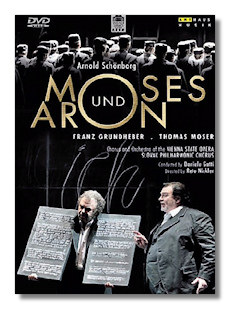
The Internet's Premier Classical Music Source
Related Links
- Schoenberg Reviews
- Latest Reviews
- More Reviews
-
By Composer
-
Collections
DVD & Blu-ray
Books
Concert Reviews
Articles/Interviews
Software
Audio
Search Amazon
Recommended Links
Site News
 DVD Review
DVD Review
Arnold Schoenberg

Moses und Aron
- Franz Grundheber (Moses)
- Thomas Moser (Aron)
- Ildikó Raimondi (A Young Girl)
- Janina Baechle (A Sick Woman)
- Peter Jelosits (A Young Man, A Youth)
- Morten Frank Larsen (Another Man)
- Georg Tichy (Ephraimite)
- Alexandru Moisiuc (A Priest)
Vienna State Opera Chorus
Extra-chorus of the Vienna State Opera
Slovak Philharmonic Chorus
Orchestra of the Vienna State Opera/Daniele Gatti
Arthaus Musik DVD 101259 134min Dolby Digital DTS LPCM Stereo Anamorphic Widescreen
Schoenberg never finished Moses und Aron, although he had plenty of time to do so. The explanation for this is unclear, but fortunately, the work is completely satisfying in its two-act torso. Hearing it on records and CDs, I've previously regarded it with more respect than affection. Now that I've seen it, thanks to this DVD, I've changed my mind: this is a great opera, although it isn't necessarily a great piece of music. Schoenberg's music is too much head, not enough heart. On the other hand, the music is fascinatingly appropriate for this subject, which similarly can be reduced to the level of the conflict between head (Moses) and heart (Aron).
To others, Moses is virtually incoherent. He wants the Jewish people to understand God and the Commandments in terms of pure idea, free of images. He is, however, incapable of making himself understood. Schoenberg mirrors this by having the singer deliver his lines in a Sprechstimme - neither spoken nor sung. Aron, on the other hand, is a true politician, and a sort of mediator between Moses and the Jewish people. He tries to interpret Moses's ideas for them in a manner that they will understand, so he sings. The conflict between Moses and Aron is the meat of the opera, but the opera's climax is an extended orgy around a Golden Calf. Aron offers this to the Jewish people as something concrete to worship, as their frustration mounts over Moses's long absence on Mount Sinai.
Director Reto Nickler gives us no orgy – at least not in a literal sense – and no Golden Calf. Instead, he introduces the idea that worship of the Golden Calf is another form of self-worship. The stage is crowded with representations of the word "Ich" ("I," or "myself"), and then the phrase "Ich bin Gott" (I am God). (Tellingly, at one point the letters are rearranged to spell "bigot.") The orgy itself is a multi-media onslaught of materialism, and of all the distasteful consequences of egotism, from excessive concern over with beauty, to callous violence. Nickler courts controversy, but his ideas work brilliantly, and one is appropriately exhausted and repulsed at the end of the 20-minute scene. Thus, the stage is set for the final scenes, in which Moses reappears and realizes, in defeat, that he will never convey the pure idea of God to his people. Perhaps Schoenberg, with his theories about music, was not so very different from Moses, in his own way.
Nickler and his team create an effective look for this production, which is both modern (including arrays and towers of video monitors) and timeless. The choruses move around smoothly and naturally, never competing with or getting in the way of the lead singers. Everything looks great, and everything sounds great too. This is a tremendously difficult score for everyone, but there's nothing tentative about the performances at every level. Grundheber's Moses has an almost maniacal intensity, and one can feel both the force of his personality and his frustration, even rage, over his inability to make others understand what he is trying to communicate. As Aron, Moser placates, cajoles, comforts, explains, and tries to be everything to everybody, and that is all reflected in his multicolored singing. I have nothing but reverence for the choruses, who perform Nickler's complicated staging without compromising musical values. The supporting singers also make a great impression. Down in the pit, Gatti is impassioned and gets precise, dramatic playing from the Orchestra of the Vienna State Opera. Here's a Moses und Aron that is anything but arid.
As a bonus, there is a live (i.e., in front an actual audience) 23-minute interview with Nickler, chorus master Norbert Balatsch, Moser, and Grundheber. Instead of the usual "oh, isn't this all wonderful" posturing, we get to hear intelligent questions about the opera, and this production, intelligently answered by the interviewees.
Both the camera-work and the sound are excellent here. The picture format is 16:9, and the sound is in the three usual formats. The English subtitles are good, for the most part, but occasional errors suggest that they were keyed in by someone who was not an English-speaker him- or herself!
Even if you're resistant to Schoenberg in principle, see this!
Copyright © 2007, Raymond Tuttle




















